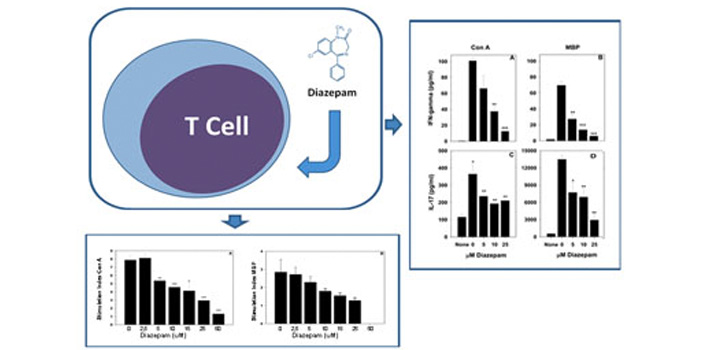Fernández Hurst et al. 2015, Neuroimmunomodulation
Objective: Experimental autoimmune encephalomyelitis (EAE) is an inflammatory demyelinating disease with similarities to human multiple sclerosis involving peripheral activation of autoreactive T cells which infiltrate the central nervous system and react to self antigens leading to damage. In previous studies, we have demonstrated that treatment with diazepam decreases the incidence and histological signs associated with the disease and diminishes immunological responses. The aim of the present work was to evaluate direct effects of diazepam on isolated T cells involved in immune responses during the development of EAE. Methods: Animals were sensitized with whole myelin to induce EAE and sacrificed during the acute phase of the disease. In mononuclear cells isolated from popliteal lymph nodes, cell viability, apoptosis induction, proliferation and cytokine production were evaluated. Results: Diazepam did not have a toxic or proapoptotic effect on the cells, at least up to the concentration of 25 μM, butproliferation, CD8+ T-cell activation and proinflammatory cytokine production were dose-dependently decreased. Conclusions: Diazepam has a direct inhibitory effect on the proliferation and activation of T lymphocytes isolated from the main lymphoid organ involved in disease onset and this could be one of the mechanisms that contribute to the beneficial effect previously observed with diazepam in vivo during EAE development.
Authors: Fernández Hurst N, Bibolini MJ, Roth GA
Article: Fernández Hurst N, Neuroimmunomodulation. 2015 Feb 25 DOI:10.1159/000369277



